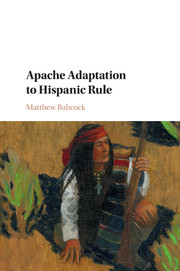5 - Collapse and Independence
Published online by Cambridge University Press: 05 September 2016
Summary
“The wives and families of the troops are in such nakedness that they can't leave their homes or go to mass,” Janos commander Alberto Maynez lamented in late January 1818. The garrison had not received any clothing in twenty months. Although Lieutenant Colonel Maynez had managed to issue soldiers a single white shirt five months ago from locally purchased coarse cotton cloth, they were now completely used up and his troops “did not have shoes or hats.” Apaches de paz were also affected by the supply problems. Suppliers from the Mexican interior had failed to send the cigars that roughly 400 Apaches and more than 130 soldiers were accustomed to receiving each week at the presidio. As Maynez explained, both groups were clamoring “because of the lack of assistance with the necessary ration, which they can't live without.” Although the severity of the cigar shortage seems open to question, the accompanying depletion of ammunition must have posed a serious threat to the security of Apaches and Spaniards at the presidio. Maynez asked for three loads of lead for balls a year ago, and they still had not arrived.
The fact that Janos and other presidios across Mexico's northern frontier were experiencing supply problems in 1818 was completely understandable considering the emerging nation was embroiled in its war for independence from Spain, and it suggests that the reservation system was in trouble during these years. Perhaps because of the resurgence of the presidial system under the Bourbons in the late eighteenth century, historians once assumed that presidios and the Apache reservations did not begin to break down until Mexican independence in 1821. Rather than a radical transformation after independence, Mexican officers’ cries of receiving “nothing for seven months” and their garrisons being “reduced to the most deplorable state,” which run rampant through documents in the 1820s, seem quite similar to conditions in the 1810s.
I contend that the establecimientos began to decline much earlier than many scholars have asserted. Major transformations in the administration of Apaches transpired in the 1790s, at the precise moment when the Spanish military had achieved more control over Apaches than ever before and long before the Mexican War of Independence and the heightened political and economic instability in Mexico City in 1810. Spaniards, Mexicans, and Apaches all contributed to the breakdown.
- Type
- Chapter
- Information
- Apache Adaptation to Hispanic Rule , pp. 172 - 212Publisher: Cambridge University PressPrint publication year: 2016

